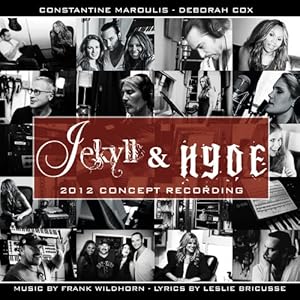New label Broadway Records is fast adding eclectic titles and talent to its catalog with its first cabaret recording and first concept cast album, though I don’t really think a 20 year old score can really have a “concept” recording this late in the game (more on that later). They’re fast becoming a label to reckon with, following on their high profile inaugural releases of Bonnie & Clyde, Lysistrata Jones, and the Nick Jonas How to Succeed EP.

It seems that Laura Osnes is just about everywhere these days. In the last year alone, the rising star has become a Tony nominee for her leading turn in Bonnie & Clyde as well as the new darling of the Rodgers and Hammerstein Organization (Encores! Pipe Dream, Carnegie Hall’s The Sound of Music and the upcoming revisal of Cinderella). She also brought Dream a Little Dream, her first go at cabaret, to the Cafe Carlyle.
She opens with “How ‘Bout a Dance,” the best from the Bonnie & Clyde before launching into a specialty “I Have Confidence.” An affable personality, Osnes has a self-deprecating sense of humor about stints in The Music Man (her dream role is Marian the Librarian) and even sings along with a demo of “Don’t Rain On My Parade” recorded by her 12 year old self. The comic highlight of the album is her reunion with Bonnie & Clyde co-star Jeremy and their spirited rendition of “Anything You Can Do” from Annie Get Your Gun (lots of delightful ad libs, and Osnes holds that note for 23 seconds). Props to her for including the obscure “Femininity” from the 1958 musical Oh, Captain. The emotional apex was with her tribute to her late mother, singing a devastating “When She Loved Me.”
Overall, Osnes is stronger in her middle register, or interpreting pop material (“I Think It’s Gonna Rain Today” and Norah Jones’ “Sunrise”) than in her less interesting ingenue/soprano mode (“Till There Was You” and “All The Things You Are”). That said, this doesn’t detract from the overall enjoyment of an accomplished recording. The single misstep I see in the recording is the inclusion of “A Whole New World,” a duet with Osnes’ husband Nathan Johnson which quite frankly lacks any real spark. This was Osnes’ first attempt at cabaret, so the patter isn’t very strong and she fills in gaps with what sounds like nervous laughter. As cabaret, this set as a whole lacks cohesiveness, but as a recording it’s quite fine. As a bonus, she included a preview of her upcoming Cinderella with a sincere rendition of “In My Own Little Corner.”

A new tour of Jekyll & Hyde starring Constantine Maroulis and Deborah Cox is on tour prior to a spring berth on Broadway. This new “concept” recording has been released in correlation with this new production. This time the orchestrations (by Jason Howland) are more rock flavored than I recall. Since the recording consists of the principal characters, the abysmal ensemble numbers are (thankfully) nowhere to be heard. The album restores “Bring on the Men,” which had been cut for the 1997 Broadway premiere. To be honest, the adaptation of the Robert Louis Stevenson novel is still fairly ridiculous, with some truly poor lyric choices from Leslie Bricusse and Steve Cuden though it has a few moments that stand out (namely “In His Eyes”).
Maroulis sings an impressive “This is the Moment,” while his “Confrontation” is something of a hot mess. Cox brings an appropriately dark, sultry vocal quality to Lucy (the role originated by Linda Eder) and acquits herself especially well on “Someone Like You” and “A New Life.” Teal Wicks doesn’t made much of an impression as Emma, a flavorless performance of a flavorless role paling in comparison to those have sung this role before. This recording was made in July and I can’t help but feel that the singers would have been better served with a later recording date, allowing them to define the characters they hadn’t yet played.
